Last Updated on October 2, 2020
Here’s to crime! Thanks to the smash success of recent Agatha Christie adaptations, like Kenneth Branagh’s “Murder on the Orient Express” and BBC One’s “And Then There Were None,” there’s been a renewed interest in adapting the queen of crime’s novels for the screen.
In an ongoing series for Willow and Thatch, Abby Murphy will be reviewing these films and comparing them with the original Christie works. This time, she turns her eye to “The A.B.C. Murders,” first published in 1936. In “The ABC Murders,” it’s 1933, and Hercule Poirot is older and greyer. Britain is divided, and the gap between wealth and poverty is great and growing greater. When Poirot receives threatening letters, he heads to the police looking for help, only to find that all his old friends have moved on. When there’s a murder, the once-great detective must take matters into his own hands.
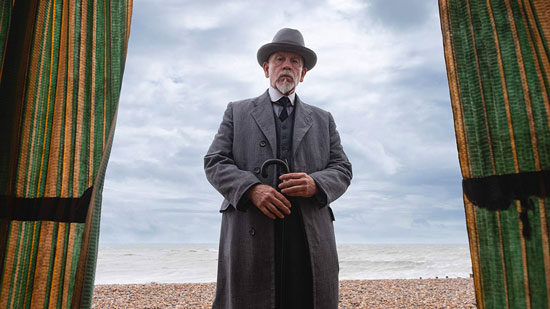
To help keep this site running: Willow and Thatch may receive a commission when you click on any of the links on our site and make a purchase after doing so.
Note: The new mini-series is darker than some other Agatha Christie adaptations, so sensitive viewers should read this review to the end and watch the trailer before tuning in.

The Book
On a visit to London to deal with business, Arthur Hastings decides to look in on his old friend Hercule Poirot, who’s now semi-retired from private investigation. Poirot has just received a troubling anonymous letter, signed only “A.B.C.,” which promises a mystery too difficult for even the great detective to crack. At first Hastings dismisses it as the work of a madman, but when a woman named Alice Ascher is found murdered at her shop in Andover, lying on top of an open A.B.C. railway guide, Poirot knows this is only the beginning.
As A.B.C. sends more taunting notes, each foretelling an alphabetical murder that always comes true, Poirot and the police struggle to keep up with the devious killer. Will Poirot ever discover a clue to A.B.C.’s identity? Or will this case go down as one of his failures?
The A.B.C. Murders received high praise when it was released in 1936, and it’s easy to see why. Christie is known for constructing intricate mysteries centered around a “crime intime,” as Poirot puts it, a crime with a deeply personal motive behind it. Her murderers attack people they know out of revenge or hope for gain. Christie does not write serial killers. With A.B.C., she subverts her well-known formula—or does she?
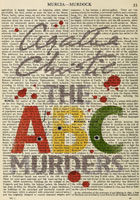 While everyone around him is sure the murderer is a “homicidal maniac,” Poirot remains unconvinced. There’s something wrong with A.B.C.’s letters, he insists, and if he can only develop a picture of the murderer he will crack the case. Christie toys with the reader throughout, even going so far as to introduce alternating third-person chapters featuring Alexander Bonaparte Cust, a fragile war veteran who can’t always remember what he’s been doing. As a result, the reader constantly questions their assumptions: could Cust be the culprit? Has Christie abandoned her tried-and-true method? Or is her brilliant detective right after all?
While everyone around him is sure the murderer is a “homicidal maniac,” Poirot remains unconvinced. There’s something wrong with A.B.C.’s letters, he insists, and if he can only develop a picture of the murderer he will crack the case. Christie toys with the reader throughout, even going so far as to introduce alternating third-person chapters featuring Alexander Bonaparte Cust, a fragile war veteran who can’t always remember what he’s been doing. As a result, the reader constantly questions their assumptions: could Cust be the culprit? Has Christie abandoned her tried-and-true method? Or is her brilliant detective right after all?
This entertaining, quick-paced narrative is laced through with melancholy. Hastings and Poirot are both older, both lamenting the passage of time, though Poirot attempts to hang on to his classic looks with hair dye. Even their old friend Inspector Japp hands over the bulk of the police investigation to a younger colleague, Inspector Crome. Christie hints that Poirot’s age may have put him off his game, yet one more reason for the reader to question the detective’s convictions. It all makes for an engaging, thought-provoking mystery that keeps the reader on their toes.
The Films
“The A.B.C. Murders” has been adapted for the screen several times. The 1965 Alphabet Murders starred Tony Randall in a comedic interpretation of Poirot, while a 1992 adaptation for ITV’s “Agatha Christie’s Poirot” series starring David Suchet remained relatively faithful to the original novel. In 2018, BBC One released the most recent adaptation, a three-part series written by Sarah Phelps and starring John Malkovich as Poirot, with Rupert Grint, Andrew Buchan, Tara Fitzgerald, and Shirley Henderson.
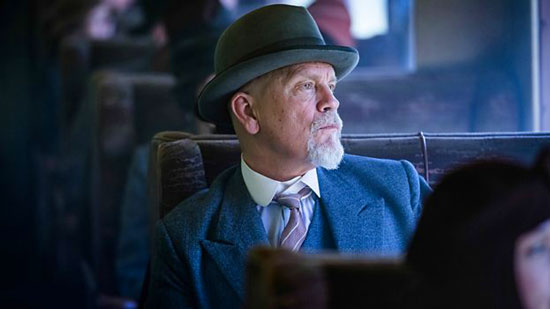
Phelps, who helmed the adaptation of Christie’s “Ordeal by Innocence” (previously reviewed here), “Witness for the Prosecution,” and “And Then There Were None,” brings a bleak sensibility to Christie’s relatively cozy murder mysteries. She makes liberal changes to the original material, choosing to draw out characters’ psychologies and the darker aspects of the interwar and postwar settings. “If you want a pure adaptation, go and get someone else to do it,” Phelps commented in a 2018 article in The Guardian, and that approach is on full display in her version of “The A.B.C. Murders.” While the bones of the narrative remain the same—Poirot receives mysterious notes from A.B.C., promising mysteries too difficult for him to solve, and the murders proceed alphabetically—it’s a much bleaker vision of the original novel.
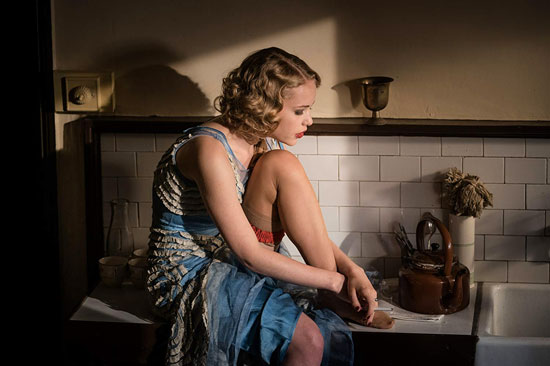
The narrative is twisted to make it as grim as possible; the series depicts A.B.C.’s murders in vivid, gruesome detail, and Alexander Cust’s landlady, who plays a minor role in the book, here prostitutes her daughter Lily to boarders for extra cash. Anti-immigration sentiment is spreading across depression-era England, and Belgian expat Poirot feels alienated in his own adopted country.
Poirot, played with melancholy determination by John Malkovich, comes across as a washed-up ghost of his former self. When he attempts to alert the police to A.B.C.’s letters, he discovers all his friends on the force have retired; a visit to Japp ends in tragedy when the inspector suffers a fatal heart attack. Poirot then approaches the young Inspector Crome (Rupert Grint), who doesn’t trust the old detective and refuses to work with him. As a result, Poirot investigates the first few murders on his own, all the while struggling to atone for a dark secret in his past. Even his history—the bulk of which is only revealed in the final act—is a wild departure from original character. This Poirot, for example, used to host murder mystery parties, exploiting the dark details of his profession to thrill the gentry. This doesn’t fit with Christie’s vision; her detective always approaches murder with a deep sense of gravity. More importantly, though, it doesn’t fit with Phelps’ reimagining, either, if we’re to believe the full history she reveals at the end.
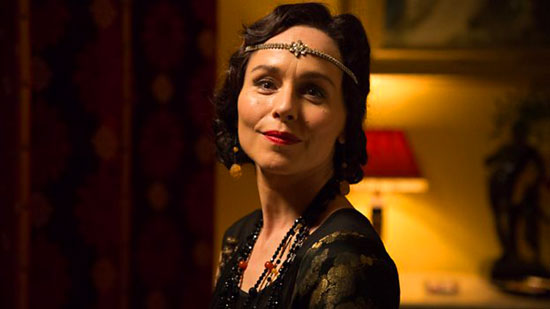
Perhaps it’s not fair to judge an adaptation purely on its faithfulness to the original. This new crop of Christie adaptations might be meant to bring the queen of crime into the twenty-first century, but I’m not convinced it’s the right interpretation for Agatha Christie. No matter how ghastly the solution to her mysteries, she always managed to insert humor, lightness, and a touch of romance while keeping the murders relatively sanitized.
Aside from Poirot’s convoluted backstory, “The ABC Murders” does succeed in its own right as a pitch-black murder mystery that highlights the seedy underbelly of depression-era England. This fits in perfectly with primetime TV’s obsession with gritty storylines and graphic footage (i.e. Game of Thrones), and viewers who enjoy their mysteries black as coffee will find plenty to enjoy here.
The Verdict: Read or Watch First?
Read first if you want a fiendishly clever Poirot mystery that focuses on the detection rather than the gore.
Watch first if you prefer your mysteries to highlight the bleak underbelly of interwar England, and if you don’t mind some mature content.
The ABC Murders (2019) is AVAILABLE TO STREAM HERE
3 episodes
Rated TV-14
You can find Abby’s Movie vs. Book review of “Ordeal by Innocence” here, “Crooked House” here and her review of “Murder on the Orient Express” here.
Abby Murphy writes young adult books about girls discovering their strengths. A member of SCBWI and The Historical Novel Society, she is represented by Laura Crockett of Triada US Literary Agency. You can visit her blog here, where she writes about reading, writing, history, and her incurable Anglophilia.
If you enjoyed this post, you’ll want to wander over to The Period Films List. You’ll especially like the Best Period Dramas: World War I List.

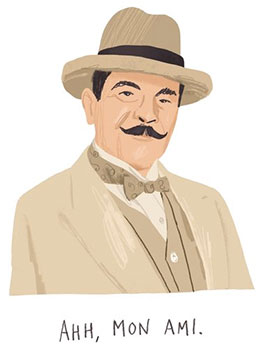
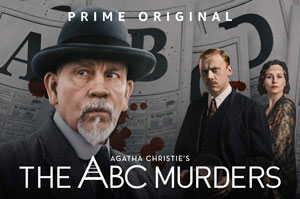
Rhoda
July 6, 2020 at 1:33 pm (4 years ago)Definitely agree with this article- the original was way better/a lot less grim and way more faithful to Christie’s style, writing, and characters- especially Poirot himself. No one can be like David suchet and honestly don’t care for the liberal changes at all. Wish they didn’t ya d to change things so much for sake of “modernizing…”:( 🙁
Bunchesofun
March 8, 2019 at 6:38 pm (5 years ago)Taken as a murder mystery. Not a Christie. Not a Poirot. It was good. But it was NOT an Agatha Christie, nor a Poirot.
Connie Jean Schlieker
February 28, 2019 at 6:51 pm (5 years ago)I watched the first hour and could not bear to keep watching. Malkovitch is a fine actor, but was woefully miscast as Poirot. A dismal and depressing attempt to “modernize” Christie.
Vickilynn Parnes
February 28, 2019 at 6:17 pm (5 years ago)Thanks for this review. I thought the ABC Murders was a travesty and did not even reflect Agatha Christie at all, as you alluded to. The story was grimy and lacked Christie’s finesse at story-weaving. Topping it off, Malkovitch was an unconvincing and unlikeable Poirot, his horrible attempt at an accent was inconsistent and grating enough that it was a relief when he dropped it. The ABC Murders was torturous to watch and many times I decided to abandon it but pressed on, hoping it would get better. It did not.
T Jensen
February 21, 2019 at 5:55 am (5 years ago)The more I hear and read about this latest adaptation of “The ABC Murders” the less likely I am to watch it.